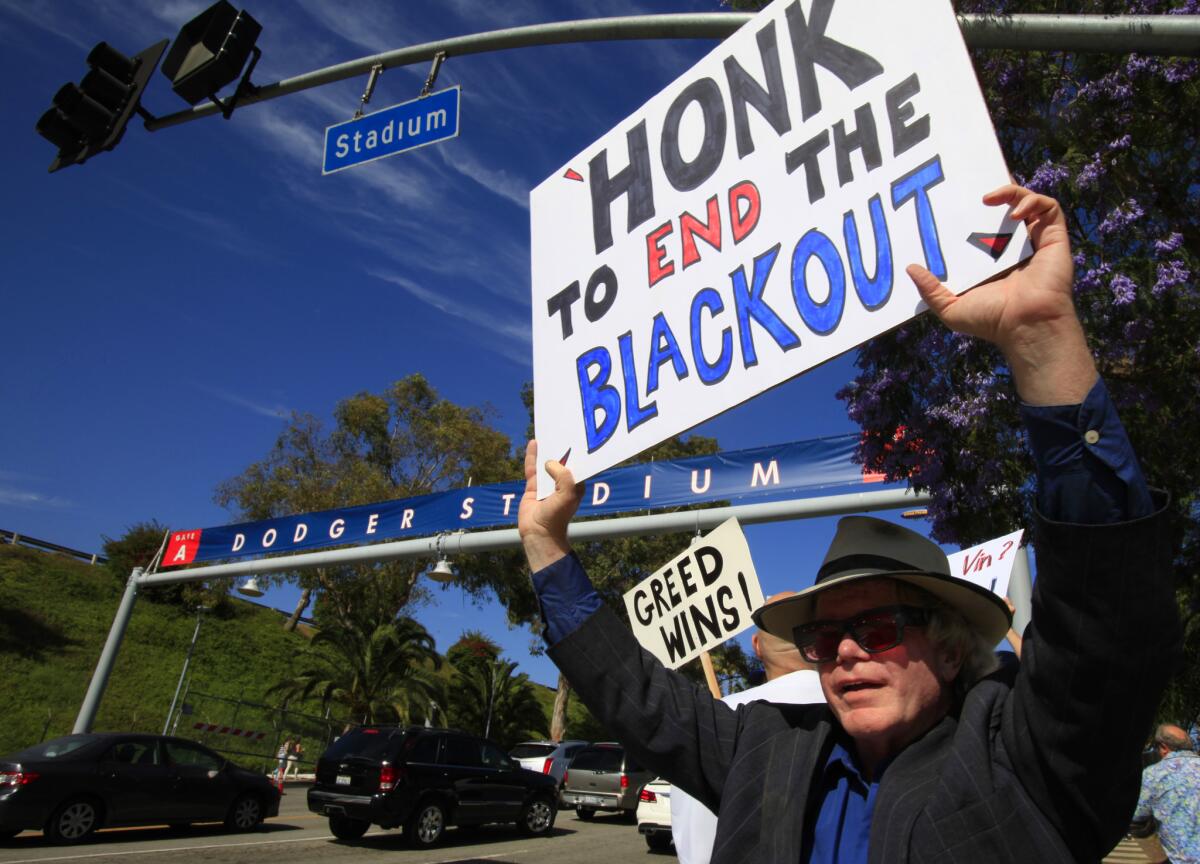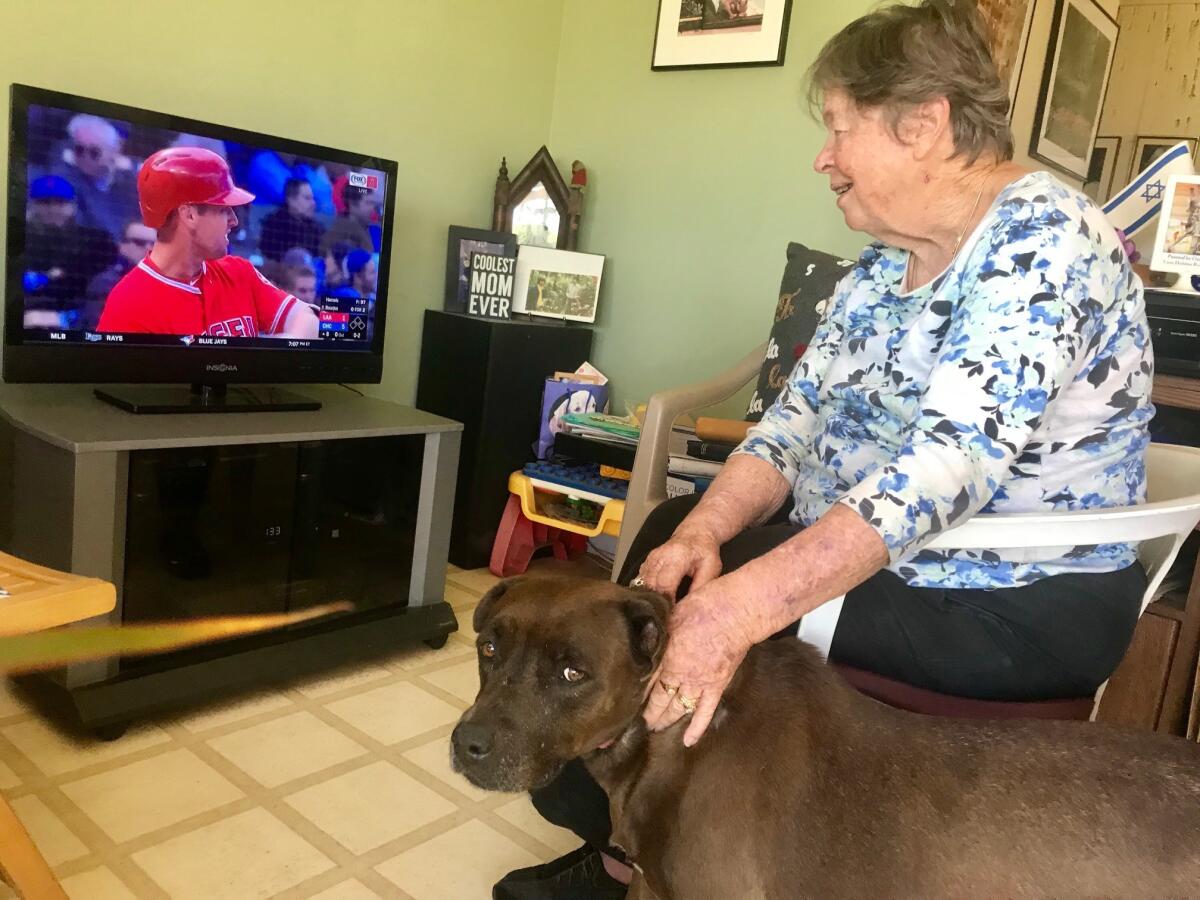Column: The Dodgers’ longest-running, greed-driven, let’s-take-fans-for-granted debacle in sports history

- Share via
Anne Goldfarb answered the door of her Mar Vista home, her dog Coco at her side, and promptly delivered an announcement.
“The Angels just homered,” she said with the same all-in grin I’ll bet she wore as a child in Studio City, playing baseball in the street with neighborhood boys.
Goldfarb led me through her living room, past the kitchen and into the family room, where the TV was on and the Angels were playing the Cubs in Chicago. The Angels, coming off a six-game winning streak, were in a hole and star player Mike Trout was on the bench with a bum leg. But slugger Albert Pujols had just put wings on a curve ball and sent it flying toward Wisconsin.
Goldfarb, 77, is the daughter of a man who composed music for Disney animation. A devoted Beatles fan, she still makes house calls as a physical therapist, and often watches baseball with one eye as she sits at the table and updates her patient files, with Coco at her feet.
She is neither a longtime Angels fan nor a die-hard. But she gave 60 years of her life to the Dodgers, beginning in 1958, and what did all that loyalty get her?
A TV blackout, a box of dusty memories, a broken heart.
So she switched to the Angels.
“I go back to when the Dodgers first came here,” said Goldfarb, meaning 1958, before there was a place called Dodger Stadium. “I remember going to games at the Coliseum.”

Like most people in Southern California, Goldfarb can’t get Dodgers broadcasts on her TV because of a blackout now in its sixth straight season. They throw you a bone now and then, with an occasional broadcast on KTLA or ESPN. But Goldfarb feels wronged, and she’s done with the team.
A year ago, she told me, she was tired of waiting for a breakthrough on the broadcast stalemate. Angels games were available on her Frontier service, and she decided to switch from blue to red. Last Friday, I took in the ballgame with Goldfarb in the same room where she and her late husband, Jack, used to watch the Dodgers together.
“Oh, shoot,” Goldfarb said when the Cubs homered. It was not going to be the Angels’ day, but there’s always tomorrow, and there’s no Angels blackout.
The trouble began when the Dodgers sold 25 years of SportsNet LA broadcast rights to Time Warner, which is now Charter Spectrum, for the go-to-hell sum of $8 billion. Other cable companies and carriers refused to pay the cut demanded by Time Warner, and so began one of the longest-running, greed-driven, let’s-take-fans-for-granted debacles in American sports history.
For most Southern California residents, five straight division-championship Dodgers seasons have been played in the dark.
Two exhilarating seasons that led to World Series spots were almost entirely unavailable to millions of the team’s biggest fans.
At the end of his splendid, red-headed career, Dodgers announcer and local treasure Vin Scully was barred from living rooms where he’d always seemed like a member of the family.
“I can’t believe they allowed this to happen and I wonder how the Dodger players feel, knowing that a lot of L.A. can’t watch them,” said Goldfarb. “Do you think it makes them feel bad at all, or apologetic?”
If there have been apologies, I missed them.
Fans do have the option of hanging out at a bar that carries Dodgers games, but that’s not for everyone. Neither is the not-quite-legal tech trick some have used to pirate Dodgers games out of the sky.
Goldfarb was one of several fans I talked to this week. Peter Bond, a Catholic deacon who lives in Yucaipa, brought up a beef I totally identify with.
For opening day this season, he ran his Dodgers flag up the pole in his frontyard, checked the listings and saw that ESPN, which he pays for as part of his Frontier service, was broadcasting the game.
“I thought, ‘This is very cool,’” Bond said. “I sat down, got myself all set for it, and it didn’t happen.”
Even though Bond, and I, and countless others pay for ESPN, we still get hit with blackouts for some games. On behalf of all of us, I demand a refund.
Bond said he began loving the Dodgers in 1962. He recalls his dad gassing up at Union Oil stations, which distributed “Meet the Dodger Family” booklets filled with features and stats on Duke Snider, Sandy Koufax, Don Drysdale, John Roseboro, Jim Gilliam and other stars.
When the Dodgers signed their $8-billion deal, Time Warner was unavailable to many residents, including me. After Charter Communications bought Time Warner and rebranded as Charter Spectrum, the service became available in most of Southern California. Some subscribers to other services switched to Charter Spectrum to get Dodgers games, but not everyone did. Loyalty to the Dodgers had taken a beating over the course of all those blackouts.
Bond said he figured for the first three years after the deal was struck that the carriers would have to come to an agreement, but he learned to stop hoping that fan consideration would prevail. Recently, he tuned in to one of the occasional Dodgers games available to him on KTLA, but the experience wasn’t what it used to be.
“I have to say, I lose interest because I don’t have the connection anymore,” Bond said. “It’s not the same.”
Why not switch to Charter?
Bond says he likes the current bundling service and the price he pays for internet, cable and phones. And, of course, it’s a big hassle to switch from one company to another.
“Were I to switch,” Bond said, “I feel like I’d be supporting the greed that spawned the cable deal that took [the Dodgers] away.”
Miguel Chaidez Jr., a blackout victim as a DirecTV subscriber, said watching Dodgers games in his Lancaster home was a ritual he enjoyed with his father and the rest of the family for decades.
“You’d get home from work and it was Vin Scully, it’s time for Dodger baseball and all that Farmer John nostalgia,” said Chaidez.
His dad is about to turn 80 and has been fighting lung cancer, but Chaidez said he and his father were not inclined to switch to Charter.
“It’s the principle,” Chaidez said.
One argument from the Dodgers has been that the broadcast-rights bonanza has paid to put a first-rate team on the field, but two straight World Series washouts may be penance for the deal with the devil.
I still hear from fans who think this will be resolved eventually, because it’s just got to be. But no matter how deeply blue your Dodgers dreams may be, the only color that matters is green. The Dodgers, for now, are doing just fine in that regard, and the warring providers have no financial incentive to compromise.
The Dodgers blackout is no longer temporary, it’s tradition.
And Anne Goldfarb has moved on.
Get more of Steve Lopez’s work and follow him on Twitter @LATstevelopez
More to Read
Sign up for Essential California
The most important California stories and recommendations in your inbox every morning.
You may occasionally receive promotional content from the Los Angeles Times.














